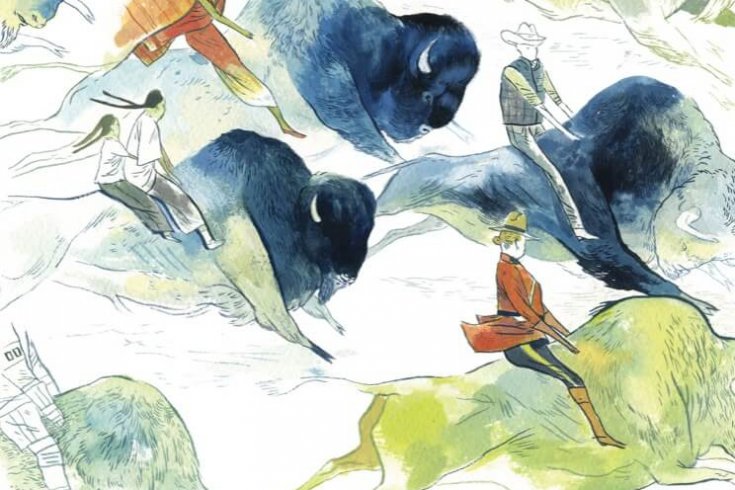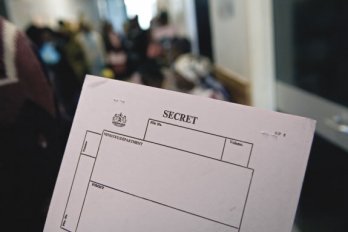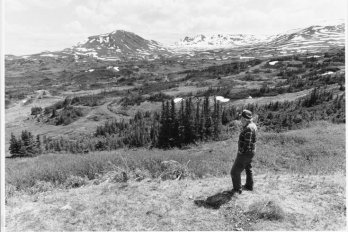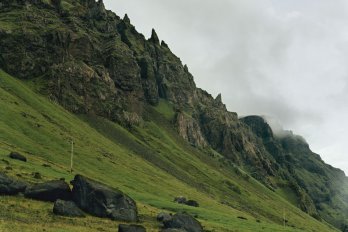In episode seven of A Literary Atlas of Canada, the ten-hour Ideas series that aired on cbc radio this past spring, host Noah Richler has a breakdown. The Toronto critic is squeezing in a visit to his therapist in between trips to St. John’s and Iqaluit, Quebec’s south shore and Vancouver Island. The therapist’s name is Dr. Atwood, and she possesses a familiar nasal voice and mischievous wit. “The books were getting heavier and heavier,” Richler tells her, “and just pressing down on me.” The problem, he explains, is that he has been proceeding on the assumption that there must be a “Canadian creation myth” unifying our literature. Only he has been having trouble identifying it or getting others to agree. “This is a difficult land, Doc,” he summarizes. “I just don’t know why we don’t have a decent myth like the Americans do.”
Though she chides him for “complaining in a rather obsessive way,” Dr. Atwood hears the patient out. Richler has opened the episode, titled “Where the Truth Lies,” in typical manner, trudging across Beechey Island in the Northwest Territories, site of the wooden graves that mark the fate of Sir John Franklin’s 1845 expedition in search of the Northwest Passage. With the Franklin expedition, Richler claims, we have the “mother of all Canadian creation myths,” both for its hubris and its failure. In his view, such myths—the stories we tell to understand ourselves—almost invariably involve failure and disappointment. He mentions the expulsion of the Acadians and the rebellions of Louis Riel, the mistreatment of soldiers during World War I and the abuse of aboriginals in residential schools. A couple of contemporary versions get tossed in as well: the 2004-2005 hockey lockout and the tale of Roméo Dallaire, the Canadian general who bore witness to the 1994 Rwandan genocide.
As he has during the preceding hours, Richler has wandered the country talking to writers about the role of landscape and place in their work. Until this episode he has grouped the conversations equally by region as by theme, and has used the programs to tease out single ideas. In “Whiskeyjack Blues,” authors Lee Maracle, Tomson Highway, and Joseph Boyden discuss everything from the trickster figure to the dangerous streets of pre-flood New Orleans, where Boyden lived, by way of exploring how native storytelling functions. “The Company Town” travels from Fred Stenson and a vanished Hudson’s Bay trading post in Alberta across to Buchans, the Newfoundland mining town where Michael Crummey was raised, to elucidate the habits of dependency and the “crippling propensity for monopoly” in Canadian life.
Now, though, Richler is seeking affirmation for an actual thesis, one that also spans, in effect, from sea to shining sea. Not only that, his notion about myths of failure is a self-conscious throwback to the nation-building theses of Margaret Atwood’s 1972 book Survival and, earlier still, Northrop Frye’s concept of the country as a hostile “bush garden.” His intention is to link the literary present with past cultural observations. But will the Canada of 2005 agree to be bound by any single narrative?
For a while, Richler’s thesis of Canada as “perennial loser,” as his therapist describes it, seems to be faring okay. Novelists Rudy Wiebe and Guy Vanderhaeghe mull over the Franklin and Riel myths respectively, while Gil Courtemanche, the Quebec author of A Sunday at the Pool in Kigali, a novel about the Rwandan genocide, wonders aloud about the problems of founding a national myth without the reserve of a “cruel and fantastic history.” Our loyalty is to values, Courtemanche says, “and values don’t make for great novels.”
Then the trouble starts. Dr. Atwood herself, who might appear a natural ally in the unified-thesis camp, delivers a cheerfully untarnished-by-history reading of the changing landscape: “Canada may be defined,” she says, “as the place where one is free to make up Canada.” This, after Richler knocks on Wayne Johnston’s door, expecting sympathy from the Newfoundland writer whose 1998 novel, The Colony of Unrequited Dreams, traces the intersections of public history and Joey Smallwood’s private life. But Johnston is having none of the thesis, and doesn’t mince his words. “I have basically no interest at all in the question of where my books fit into a way of interpreting Canada,” he says. He is certain that there is no coherent history worth trying to interpret. “It is extremely difficult and probably pointless to find a unifying idea or concept or even tradition,” Johnston says of the country. Canadian literature, he seems to infer, can only ever be defined in physical terms: who writes it, where he or she lives, what compels their imaginations. All metaphysical conjectures are not only that—conjectural, borderline fantasy—but are also based on the false premise that there can be an allinforming theory about Canada, or anything else.
Richler gets testy with Johnston, calling his thinking “preposterous,” and later assures listeners that, as per the guidelines of post-structuralism, we are entitled to ignore an author’s stated intentions when interpreting his work. Still, he is taken aback by the objection. Johnston suggests that his own novels contain “anti-ideas.” The exchange leaves Richler wondering if Canada might actually be an “anti-nation,” one that naturally lacks a single governing idea. But he isn’t ready to abandon the search for an overarching unity, and what he proposes instead, as “the one resilient candidate for binding myth,” is none other than multiculturalism, a social policy/reality that is fluid and active and suited to a nation “living in the vivid present.” The series returns to the notion in its final hour.
Noah Richler’s breakdown is tongue-in-cheek, of course, as is his confrontation with Wayne Johnston. Both are done in the service of dramatizing a revelation that appears to have occurred during the year-long making of A Literary Atlas of Canada. As such, “Where the Truth Lies” is more than just smart, nervy radio; it is radio attempting to be as sprawling, unresolved, and in the vivid present—as rawly physical, perhaps, instead of pretentiously metaphysical—as the country itself.
A ten-hour radio documentary on any subject can easily come to resemble a cross-country car journey in the company of a crashing bore. Because the bore is driving, he dictates the rules: the routes and rest stops, which CDs get played. A Literary Atlas of Canada encourages this kind of analogy. It is a hardcore road series, and, as expected, certain stretches of highway are more pleasing than others. The glorious Gaspé route, for instance, versus the Miramichi detours through New Brunswick; the perpetual postcard linking Banff with Kelowna as opposed to the Kenora to Thunder Bay run.
Happily, Richler is a bracing presence behind the wheel. He can be funny (Ottawa is the “Brasilia of the North”), impolitic (“This could be Africa,” he remarks about Inuvik’s de facto apartheid), scathing (“Empire and its residue teaches all sorts of bad habits,” he says of entitled ascendancy in Toronto), and quirky (the NHL lockout as a myth of failure?). He isn’t afraid of detours, allowing writers to perambulate if what they are saying is interesting, and, though overly fond of the Beatles, his taste in music is decent.
Nor is this driver afraid of getting his vehicle scuffed en route. Ambient noises surround most of the conversations, ranging from the bird call inflecting Robert Bringhurst’s thoughts on storytelling and the natural world to the squeak of boots over snow during a frigid walk down the “road to nowhere” outside Iqaluit. While these backdrops don’t always stay where they belong, the sounds ensure that the landscapes rendered alive in books retain their character on radio.
In short, Richler relishes making radio in weather and is willing to go anywhere in any season in order to situate writers in their elements. He certainly delights in producing radio as far away from the cbc Broadcasting Centre in Toronto as possible without needing a passport. (He does leave the country once, to track down Tomson Highway in southern France.) In “The Company Town,” a metaphysics is posited to account for the decentralization of the Canadian psyche. We abide a bossy central authority—a Hudson’s Bay Company, an Ottawa, a Hogtown—in no small part because we know we can count on sheer geography to diminish that control, render it at most a minor annoyance in our lives. While his ambivalence about, or indeed rejection of, centralized power and expertise might explain Richler’s peripatetic tendencies, it soon becomes apparent that the real lure is the simple pleasure of being on the road. Following the contours of a vast and differentiated land, Richler’s literary Canada is a highly physical place from the start.
The series, largely a sequence of almost novelistic journeys, is bookended by an argument. “The Virtues of Being Nowhere” opens with a three-part declension of Canada as an evolving noun. According to the parsing, the nation started off being “nowhere,” a destination literally off the European map. (For native storytellers, of course, it was never anything of the sort.) Jane Urquhart’s childhood in the deep Ontario bush is presented as a classic nowhere landscape, and Margaret Atwood, a dominant presence throughout, discusses early immigrant writers like Susanna Moodie. (Atwood also says, “There isn’t really any nowhere. There are only other people who think a place is nowhere.”) Richler remarks on how the “garrison mentality,” outlined decades ago by Frye and Atwood and which posited Canadians as quasi-victims of their own harsh landscape, put a stigma on generations of writers. By the sounds of it, certain authors today, including Urquhart, continue to feel that weight.
Next, Canada is redefined as “nowhere in particular.” Richler is thinking about urban centres during the last half of the twentieth century—or their much-maligned suburbs, to be more exact. Toronto writers Barbara Gowdy, Lawrence Hill, and Paul Quarrington gather to muse on “Non-Mills,” or Don Mills, the suburb built in the 1950s north of the city around the “wilderness of the ravines,” and the site of their upbringings. A conversation with MG Vassanji, who relates how South Asians living in Tanzania in the early 1970s were excited by Canada without really knowing much about it—a circumstance he describes in No New Land—throws up a separate idea: Canada as “anywhere.” But thoughts about Canada from outside give way to the third declension, the “somewhere quite distinct” of the nation as it is unfolding in the early twenty-first century.
Episode ten, “Room Available,” is titled after a remark by novelist Yann Martel, who once referred to Canada as a kind of giant hotel. Though Martel himself ruefully contextualizes his comment—he simply meant that the country houses a vast range of people, like a busy hotel—Richler decides the metaphor remains apt. Canada’s “sole binding myth” is our ever-burgeoning diversity, a “polyphony of voices” that is altering our literary landscapes for the good. Gone, for sure, is the paradigm of the land as an empty place of menace. Multiculturalism has not only validated a “creed of racial sensitivity” among Canadians, encouraging a belated recognition that aboriginals have always lived in those spaces we presumed desolate and hostile, it has also shown us that nearly every place across the country is habitable and safe. “Iqaluit is the new Seattle,” novelist Douglas Coupland jokes of the disappearance of hinterlands.
Most of this final hour is devoted to talking to young Vancouver writers, including Coupland, Zsuzsi Gartner, and Timothy Taylor, about their city’s position as gritty urban centre and natural wonderment. Richler declares Vancouver the perfect setting for Canadian literature to continue to play out these emerging dynamics: diversity and sensitivity, nature as inhabited and yet still disquieting, a society in perpetual evolution. While this may be true, the two most striking radio moments in “Room Available” occur away from the city and serve to complicate the notion of multiculturalism as current binding myth.
First, there is Robert Bringhurst’s trancelike monologue on nature delivered from his cabin in the woods of Quadra Island. The pitch of the poet’s voice and the cadences of his elegant thinking are offered in harmony with the forest around him. Equally eloquent is the silence—ten seconds of dead air—that greets a question to Rohinton Mistry about whether Canada has had any impact on his novels. Though he eventually replies, Mistry’s hesitation is the better answer. Richler is too smart to edit out the pause, leaving it there, perhaps, as a reminder not to speak too confidently about the certain direction of Canadian literature. Writers are by necessity always lost in some space, and it might well not be the one where they reside. You can be near the future of Vancouver and still be creatively sequestered in the past of nearby primal woods. You can be a model of multicultural literary Canada and still be forever at home—on the page at least—in the Parsi community back in Bombay.
A comment by Barbara Gowdy in ” The Virtues of Being Nowhere” highlights a tension in the series. Gowdy, who once published a novel about elephants, comments that being from “Non-Mills” may be a blessing for the author who wants to “float out” into the wide imagined universe. Despite its length, A Literary Atlas of Canada has little time for discussions about what literary landscapes are and how they are created and sustained. It is almost purely concerned with literature and public discourse and grounding literary realities and, as a result, isn’t especially attentive to the qualities of the books themselves or the writerly process.
Throughout the series, dramatic excerpts are offered from dozens of Canadian novels and stories by way of illustrating the observations of their authors. And yet, none of these readings include descriptions of actual places. They are all descriptions of imagined ones. Douglas Coupland may be from Vancouver, but his fiction isn’t. His fiction is from his head. Novels are always novels before they are anything else, including mirrors of reality. There seems to be scant room in Richler’s atlas for Canadian books situated outside the country or for stories, such as Yann Martel’s Life of Pi, that openly declare their topographies to be other than approximations of the real. No poetry is welcome either.
Likewise, Gil Courtemanche’s invitation to consider a Canadian geography of values isn’t taken up. Martel’s closing observation that our sole distinguished cultural attribute might be our creed of tolerance is on a similar tack. What about a possible moral landscape running coast to coast in our literature? Wayne Johnston probably wouldn’t care for this thesis either, but for this reviewer, at least, the most obvious quality shared among books by Canadians is a certain value system. (That, and a propensity for linguistic conservatism. Aren’t the landscapes in novels made up first and foremost by language? ) While Richler’s instincts to steer clear of literary theory are sound, at times his focus can be constricting.
The explicit assertion of A Literary Atlas of Canada is that books published in our continent-sized country must first be approached through their geographies. This is a simple but original thought. Two of the more haunting interviews in the series involve Gwich’in novelist Robert Arthur Alexie and Montreal writer Gaétan Soucy. To better appreciate the implications of these authors officially sharing a literary flag, I read Soucy’s The Little Girl Who Was Too Fond of Matches and Alexie’s Porcupines and China Dolls with a view to thinking of them as part of a single literature.
Besides the quality of the work and the portraits of damaged individuals, the distance between the novels includes—in no particular order—4,000 kilometres, two languages, and at least one cultural and literary tradition. Alexie is a Tetlit Gwich’in native from Fort McPherson in the Northwest Territories. Porcupines and China Dolls, his 2002 debut, howls at the disaster of colonialism in the far North. It draws equally on the western novel and storytelling, mixing scenes of raw realism with explosions from the native dream world. The remote Blue Mountains are its landscape. The only non-aboriginal references are to American TV and cinema. Down south means Alberta and British Columbia; Ottawa, Toronto, or any place further east scarcely exists.
Gaétan Soucy teaches philosophy near Montreal. The Little Girl Who Was Too Fond of Matches, first published in 1998, is a parable. Featuring an epigraph by philosopher Ludwig Wittgenstein about pain, the book is a prismatic text concerning two siblings raised in a deprivation tank of weirdness and cruelty. Cultural allegiances lie with European philosophy and the new French novel; no landscape is identified, either by location or time. The novel was a bestseller in Quebec and has been translated into numerous languages and widely published abroad. But its muted resonance in English Canada may suggest that recent rumours of the death of the foundation myth of the two solitudes—a binding story that Richler notably downplays—have been exaggerated.
In exactly which ways can one speak of Alexie and Soucy as both being writers of Canadian literature? Certainly not using the same easy definitions that authors from Berlin or the Black Forest might employ to mark their shared identity as German, nor, arguably, with even the confidence that a novelist from Yunnan province in southern China would affirm his kinship with a poet born in Manchuria.
Canada, of course, has always been a physical enormity connected by only the most tenuous of theories or, for that matter, railway lines. Now, with many formerly empty zones being filled in by authors such as Robert Arthur Alexie, the country is, if anything, getting bigger by the minute. No surprise, it is also acting less like a nation-state and more like a singular social, cultural, and political entity. Whether or not the overtired word multiculturalism is the right term to describe the literary manifestations of that entity is debatable, and Richler may find a better word in time for the publication of the series in book form in the spring of 2006.
By rendering that vastness and evolution so visceral, and for insisting on taking literature out on the road, A Literary Atlas of Canada is engaging in a new kind of thinking. Credit Noah Richler and the CBC for making bookish radio and for recognizing the cultural work that the twenty-first century requires. Nation building—or anti-nation building, perhaps—just can’t be like it was back in the old days. Dr. Atwood may have the diagnosis correct: Canada is “the place where one is free to make up Canada.”





